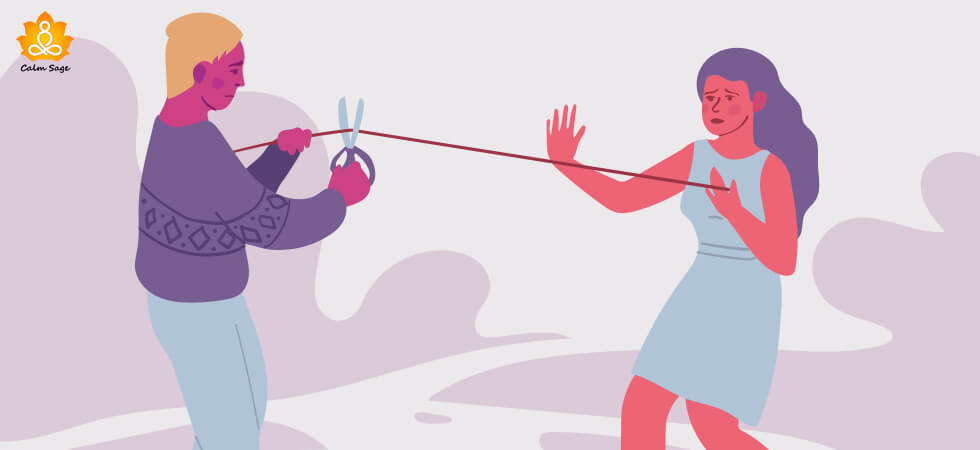How To Stop Being Codependent in Your Life | 7 Tips To Step Out of This Trap

We human beings are social in nature. We are dependent on each other to fulfill our basic needs of feeling belonged, safe and loved. But in some instances these needs may go beyond the healthy category and into an unhealthy pattern, taking a form of codependency in a relationship.
A codependent relationship differs from a healthy relationship. While in a healthy relationship it’s about equal give and takes, But in a codependent relationship one individual tends to give more (caregiver) and the other one takes all the attention (care is taken).
This in turn becomes an unhealthy codependent relationship where one individual becomes dependent on the other for meeting their needs and the other one continues to pour their efforts into it.
In the end, it all feels like a trap that consumes every ounce of you at the emotional, physical, and mental levels. That is why breaking out of this trap and exploring the true sense of a relationship is crucial.
Don’t know where to start from? Continue reading to find What is codependent relationships and the Signs of Codependent relationships and how to get out of a codependent relationship.
What is a Codependent Relationship?
According to the American Psychological Association, codependence can be defined as a pathological addiction wherein there is a mutual and emotional dependence between two people on one another. It does not necessarily involve both partners in a relationship.
Usually, codependency can go to the extent that a person becomes so reliant on the addict that they will do whatever it takes to keep them happy and interested in them.
According to Boris, “Healthy love involves a cycle of comfort and contentment, while toxic love involves a cycle of pain and despair.”
The latter case is that of a codependent relationship where an individual doesn’t feel safe and secure to communicate their emotions or needs to the partner.
What is the Root Cause of Codependency?
When a codependent relationship is futile then why do we even fall into this trap in the first place? Well, childhood has an important role to play here.
Many people are exposed to an unstable and unsupportive environment during their childhood which may display in form of codependency later in life. Sometimes you might not even be able to trace down which instance you carry from your childhood to adulthood.
Some childhood factors that are linked with codependency are:
- Unsupportive family and siblings.
- Neglect during early stages of life.
- Lack of nurturing.
- A very judgemental or shaming environment.
- Too scary, abusive, or harsh punishments.
- A chaotic and unhelpful household.
- Manipulative behavior.
Signs Of A Codependent Relationship:
Definitely, not all relationships are codependent in nature. In fact, codependent behavior can occur in several different ways in different relationships. While in some cases a partner might look for dependency, in others the negativity might just reward the addiction.
So, how do you know if You’re in a Codependent Relationship or not? Well, here are some warning Signs Your Relationship Is Codependent mark:
- Low self-esteem
- People-pleasing behavior.
- A strong desire to be liked by those around.
- Obsessive thoughts and behaviors about partners’ whereabouts.
- Intimacy issues.
- Lack of boundaries.
- Overreaction to a situation.
- Difficulty communicating.
- Excessive self-sacrifice.
- Trouble trusting others.
- Feeling responsible for every problem in the relationship.
Can you relate to these signs? If yes, then there is a chance that you are codependent.
Well, the good news is you can step out of this trap of codependency. Now that you have gained the acceptance of being in a codependent relationship, the next step is to work towards resolving those codependent behaviors.
Identifying the Patterns of Codependent Behavior
It has often been argued that identifying signs of codependent behavior might not be that easy as identifying its pattern.
So here are some key patterns of a codependent relationship that are common for codependent behavior:
- You find yourself pleasing the other person and everyone in the room.
- You might find yourself saying no to everything and setting unrealistic boundaries.
- Or on the flip side, you might find it difficult to say no to anything.
- You are always looking for opportunities to take care of others around you.
- Some forms of codependency may be extremely controlling.
- Feeling of taking too much responsibility in the relationship.
- Thinking of handling everything on your own may hold you back from seeking help from others.
- You might find it difficult to make decisions on your own.
- To avoid any arguments with the partner you will go to any extent.
How to Stop Being Codependent in Your Relationship?
Codependency may soon turn from a basic act of love to an insidious part of life. Wherein, an individual is tricked to believe that s/he is not whole without our significant other. This definitely takes a toll on an individual mental and emotional well-being.
The only way out of a codependent relationship is by breaking this trap! We are sharing with you seven ways to stop being codependent and make it all work for you.
1. Be Honest With Yourself
You have to be honest with yourself to admit that there is a problem that you need to identify and work upon. It will take a lot of courage and definitely won’t be the easiest thing to do, but you have to be patient with yourself.
The first step in changing the dynamics of your codependent relationship is to allow yourself to open up about how you feel and why you have been acting this way. This will further help you initiate change.
2. Recognize Codependency
To put off a fire you have to first identify where the fire is. Similarly, to deal with your competency you have to first identify the codependency in your relationship. Can you relate to the signs of codependency or a pattern discussed above?
Keep a list and keep track of things that you are practicing in a relationship, match them with this list, and realize when you do something that marks codependency. Accept it and don’t be ashamed of it.
3. Set Boundaries
Not having strong and healthy boundaries is one of the key reasons that codependent relationships continue. To work through codependency setting healthy boundaries is crucial. It will mainly focus on things that you won’t be doing for your partner and things that you will be doing for yourself. A three-step approach that you can put to action and set boundaries:
- Determine your core values: To keep yourself on track it is important to identify what is important to you. That is why identify what matters the most to you so that your needs and wants are not eclipsed with that of your partner.
- Practice polite refusals: You do not have to keep saying only yes or only no. While you should be accepting requests that don’t temper your self-worth, practicing polite refusals for the ones that do is required.
- Take time to reflect on yourself: Reflect on yourself to identify what drives you, motivates you, and inspire you. This will be your push on this journey of stop being codependent.
4. Start Valuing Yourself
Instead of belittling yourself start valuing yourself! It has been found that those who heal from codependent benefit by developing a stronger sense of self. Because when you start valuing yourself, you develop a sense of self-worth. You can consider the following little steps towards valuing yourself and stepping out of codependency.
- Spend time with those who treat you well: Surround yourself with people who love you, support you, and are positive for you. Instead of spending time with those who drain your energy, spend time with those who are supportive of you.
- Engage in what you enjoy: Take a pause and focus on what you enjoy doing the most. You have spent enough time on focusing what others want and enjoy, refocus on your needs and happiness now.
- Work on positive self-talk: Don’t let the negative self-talk weigh you down or criticize you. Challenge them with positive self-talk. Keep affirming a positive mantra in your life.
- Take care of yourself: Make a list of your needs and work on them. Nurture yourself to flourish beyond codependency.
5. Resist Your Urges
Your urges of taking all the responsibilities, being the giver, and understanding the needs of the other person are the key forces that keep you in the cycle of codependency. While there is nothing wrong with being there for someone but to the extent where it becomes emotionally and mentally exhausted is concerning.
To put a stop to these urges of being codependent practice compassion and only offer help when someone asks for it upfront. Be there for others but don’t over assume your need in their life. Wait for them to approach you.
5. Get Counseling
Taking help from professionals can help you identify the childhood issues that might be showing up in the form of codependency in you. You can then further learn effective coping strategies to deal with codependency. Seeking help from professionals can help you in the long run by identifying the deep-seated issues and further resolving them.
A counseling environment provides you a safe environment where you will be provided with exercises and techniques that will help you gain control over your urges and step out of the codependent relationship.
Get Your 7 Day Free Counselling
Disclaimer: As BetterHelp Affiliate, We may receive compensation from BetterHelp or other sources if you purchase products or services through the links provided on this page.
6. Join Support Group
There is a support group that is dedicated to resolving codependent relationships known as Co-Dependents Anonymous. They have developed a 12-step program that helps an individual breakthrough the cycle of codependency and start focusing on the self.
This program helps you shift your focus from what another person should be in a relationship with to who we should be in a relationship. Thus, teaching you to be emotionally available for yourself and building healthy relationships with self before others.
More Online Support Groups:
5 Best Depression Support Groups In 2021
Best Online Bipolar Disorder Support Groups
Best Online Divorce Support Groups to Approach
Top Free Online Anxiety Support Groups to Join in 2021
We understand dealing with codependency can be challenging to overcome but trust me it is even more challenging to live with it. That is why taking one step at a time to step out of codependency is the best you can do for yourself and those around you.
- The National Suicide Prevention Lifeline – 1-800-273-8255
- National Domestic Violence Hotline – 1-800-799-7233
- NAMI Helpline (National Alliance on Mental Illness) – 1-800-950-6264
- RAINN (Rape, Abuse, and Incest National Network) – 1-800-656-4673
If this article reminds you of someone who might be struggling with these signs or patterns of dependency, share it with them. Help them get out of this trap and explore their best life that is waiting ahead of them.
Thank you for reading!




















